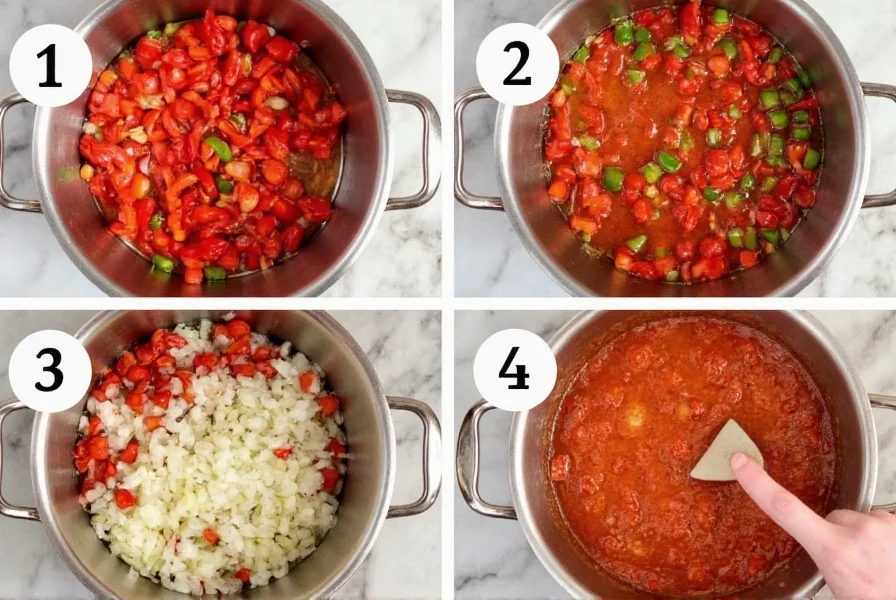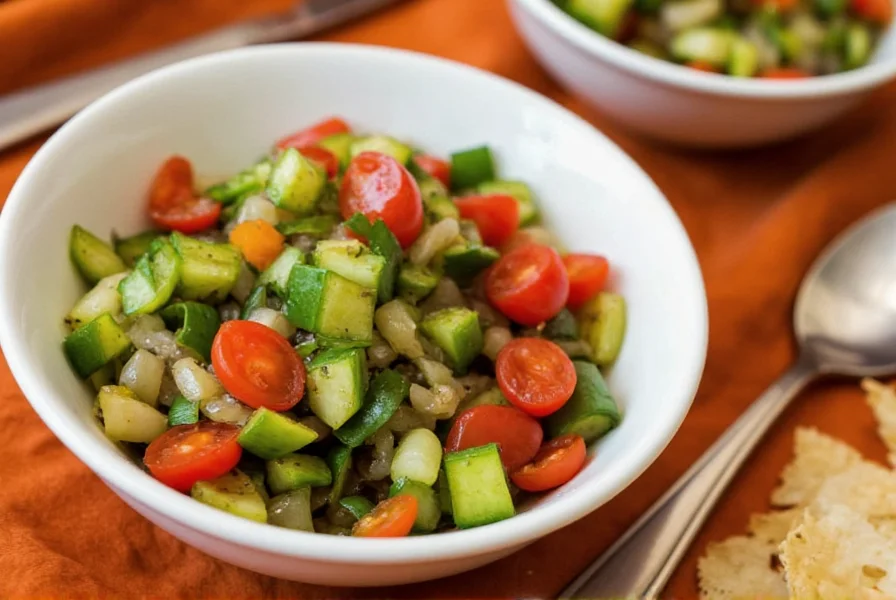Creating the perfect pepper and onion relish requires understanding the balance between sweet, sour, and savory elements. This traditional condiment transforms simple ingredients into a flavor powerhouse that elevates everyday meals. Whether you're dressing up a burger, complementing grilled sausages, or adding complexity to cheese boards, a well-crafted relish makes a significant difference in your culinary creations.
What Exactly Is Pepper and Onion Relish?
Pepper and onion relish consists of finely diced bell peppers and onions cooked with vinegar, sugar, and spices until the mixture thickens. Unlike chutneys which often include fruit, or pickles which maintain vegetable integrity, relish features small, uniform pieces suspended in a flavorful liquid base. The best homemade pepper and onion relish achieves a harmonious balance where neither pepper nor onion dominates, creating a versatile condiment suitable for numerous dishes.
Essential Ingredients and Their Roles
The magic of a perfect pepper onion relish recipe lies in ingredient selection and proportion. Understanding each component's contribution ensures consistent results:
| Ingredient | Function | Recommended Quantity |
|---|---|---|
| Bell peppers (mixed colors) | Provides sweetness and texture | 2 cups finely diced |
| Yellow onions | Creates savory depth | 1 cup finely diced |
| Apple cider vinegar | Balances sweetness with acidity | 1 cup |
| Granulated sugar | Counteracts acidity | 1/2 cup |
| Mustard seeds | Adds complexity and texture | 1 teaspoon |
Step-by-Step Preparation Guide
Follow this detailed process for reliable results every time you make homemade pepper and onion relish:
- Prepare 2 cups mixed bell peppers and 1 cup yellow onions by finely dicing to uniform 1/8-inch pieces
- Combine all ingredients in a non-reactive saucepan over medium heat
- Bring mixture to a gentle boil while stirring frequently
- Reduce heat and simmer uncovered for 25-30 minutes until liquid reduces by half
- Test consistency by placing a small amount on a cold plate—if it mounds rather than runs, it's ready
- Cool completely before transferring to airtight containers

Customization Options for Personal Preference
One of the advantages of making your own sweet and sour pepper onion relish is the ability to adjust flavors to your taste. Consider these modifications:
- Heat level: Add 1-2 finely diced jalapeños for spicy pepper and onion relish
- Sweetness: Substitute brown sugar for half the granulated sugar for deeper flavor
- Texture: Pulse in food processor for chunkier or smoother consistency
- Spice variations: Include 1/2 teaspoon celery seeds or turmeric for additional complexity
Optimal Uses and Pairings
Understanding how to use pepper and onion relish properly maximizes its culinary impact. This versatile condiment shines in numerous applications:
- As a topping for grilled burgers, hot dogs, and sausages
- Mixed into tuna or chicken salad for added dimension
- Served alongside cheese boards featuring sharp cheddar or feta
- As a sandwich spread for deli meats and roasted vegetables
- Stirred into cream cheese for an instant party dip
Proper Storage Techniques
Refrigerator pepper and onion relish maintains quality for 2-3 weeks when stored correctly. Follow these guidelines for optimal shelf life:
- Transfer cooled relish to clean, airtight glass containers
- Ensure relish is completely submerged in its liquid
- Refrigerate immediately after cooling
- Use clean utensils when serving to prevent contamination
- Discard if mold appears or if off odors develop
For longer preservation, process jars in a boiling water bath for 10 minutes to create shelf-stable canned relish. Properly canned relish maintains quality for 12-18 months in a cool, dark place.
Troubleshooting Common Issues
Even experienced cooks encounter challenges when making quick pepper onion relish. Address these frequent problems:
- Watery consistency: Continue simmering until liquid reduces sufficiently; the relish will thicken more as it cools
- Overly sweet: Balance with additional vinegar, 1 tablespoon at a time, reheating gently
- Insufficient flavor: Add salt incrementally or include additional spices like paprika or garlic powder
- Vegetables breaking down: Reduce cooking time and avoid over-stirring during simmering
Frequently Asked Questions
Can I use different types of peppers in my relish?
Yes, you can create variations using different pepper types. Bell peppers provide sweetness, while hotter varieties like jalapeños or poblano peppers add complexity. For traditional pepper and onion relish, maintain a 2:1 ratio of bell peppers to hotter varieties to balance flavor without overwhelming heat.
How long does homemade pepper and onion relish last?
Refrigerated pepper and onion relish maintains quality for 2-3 weeks when stored in airtight containers. For longer storage, process jars in a boiling water bath for shelf-stable preservation lasting 12-18 months. Always check for signs of spoilage like mold, off odors, or unusual texture before consuming.
What dishes pair best with pepper and onion relish?
Pepper and onion relish complements grilled meats exceptionally well, particularly burgers, sausages, and bratwurst. It also enhances cheese boards, sandwiches, and charcuterie platters. For creative uses, try mixing it into tuna salad, spreading on grilled cheese sandwiches, or serving alongside roasted vegetables for added flavor dimension.
Can I reduce the sugar in pepper and onion relish?
Yes, you can adjust the sugar content to taste, but remember that sugar balances the vinegar's acidity. For a less sweet version, reduce sugar to 1/4 cup and consider adding 1 tablespoon honey for depth. Sugar also contributes to texture and preservation, so significant reductions may affect shelf life and consistency.
Why did my relish turn out too watery?
Watery relish typically results from insufficient cooking time or improper vegetable-to-liquid ratio. Continue simmering uncovered until the liquid reduces by half and the mixture mounds on a cold plate test. Remember that relish thickens considerably as it cools, so avoid over-reducing during cooking.











 浙公网安备
33010002000092号
浙公网安备
33010002000092号 浙B2-20120091-4
浙B2-20120091-4